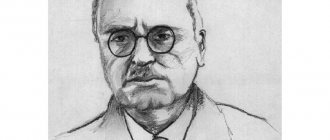One of the most common forms of dementia is Alzheimer's disease. An acquired neurodegenerative disease is characterized by the slow death of nerve cells and manifests itself as a persistent intellectual disorder. A person becomes unable to acquire new knowledge and skills, and also gradually loses previously acquired ones. In addition to memory impairment, problems arise with speech and spatial orientation. The patient loses the ability to care for himself, body functions go out.
When diagnosing, behavioral analysis, cognitive reactions, and MRI results are of great importance. Although a cure for Alzheimer's disease has not yet been found, there are ways to prevent its occurrence or reduce the severity of symptoms.
What is dementia?
Dementia (acquired dementia) occurs as a result of gradual organic damage to brain cells due to various reasons, which we will discuss in more detail below. The irreversible process of death of brain cells causes a gradual deterioration of memory (primarily short-term) and a decrease in a person’s mental abilities. At first, the symptoms are almost invisible (it all starts with mild forgetfulness), they gradually increase until a complete and irreversible collapse of the personality occurs.
Dementia is:
- loss of the ability to reason sensibly, the ability to think;
- the complete lack of control of a patient with dementia over his emotions;
- inappropriate behavior, especially in the later stages of the disease.
Acquired dementia is always irreversible: dead brain cells are not restored. That is why the most important thing is timely (the earlier, the better) diagnosis and treatment. The sooner treatment is started, the earlier the pathological process will be stabilized and the longer the patient will be able to maintain a clear mind.
Currently, the causes of senile dementia are well studied. They are divided into two groups: hereditary and environmental (environmental causes).
Environmental
There are several reasons, we list them:
- Advanced age. After 60–65 years, the risk of the disease increases significantly, this is due to the fact that older people, due to their age, are more susceptible to external factors.
- Diabetes. This disease often affects blood vessels, including the brain, and in the absence of adequate treatment can lead to dementia.
- Stroke. When a stroke occurs, certain blood vessels are damaged and there is bleeding in the brain, which can contribute to the onset of dementia.
- High pressure. Hypertension also negatively affects the health of blood vessels and can lead to dementia.
- Any brain injuries, as well as tumors, hematomas, large abscesses.
- Smoking and alcohol have a huge negative impact on the brain. The result is senile dementia.
- Level of education and professional activity. Highly educated people who engage in mental work all their lives are less susceptible to senile dementia, and vice versa: people who do not have an education and do not train their brains get sick more often, and their disease progresses faster.\
- Violation of immunity and metabolism in the body.
Hereditary
If a blood relative of an older person has had Alzheimer's disease or other similar diseases, the likelihood of developing dementia increases.
Acute type amnesia
This type of memory loss is very similar to the previous one. Observed most often in older people, it manifests itself in the fact that there is a rapid deviation from the intended goal. The simplest example: a person goes to the kitchen to get water, and along the way he forgets what he wanted to do. Severe amnesia also occurs in young people. This is due to a disruption in the functioning of the brain. From a medical point of view, a reaction occurs that is similar to a mini-stroke, and previous activities suffer from this.
Among the reasons for the appearance of such an illness are a sharp rise from a sitting position and other similar actions. Memory loss in older people has more serious consequences. Therefore, you need to see a doctor as soon as possible. The doctor will prescribe medications aimed at improving vascular activity, which will benefit the elderly.
Risk factors for developing the disease
One of the most important risk factors for developing a disease such as dementia is advanced age, which is why the adjective to the word dementia is almost always the term “senile.” On the other hand, the statement “old age equals dementia” is fundamentally incorrect; this disease is not an inevitable consequence of aging.
As a result of numerous studies, it was found that:
- regular exercise;
- to give up smoking;
- body weight control;
- proper balanced nutrition;
- control blood pressure, cholesterol and blood sugar levels
reduce the risk of developing dementia. Conversely, if an older person does not control the factors listed above, the risk of developing dementia increases.
Other risk factors are low level of education, persistent depression, and social isolation. In the same series we can name such cognitive functions as thinking, imagination, attention, perception, that is, the constant mental activity of an elderly person.
Older women are more prone to such a serious age-related disease as Alzheimer's disease, while men, on the contrary, are more likely to develop dementia.
Genetic predisposition plays a significant role in the development of this disease. If someone from the family, especially in the so-called first generation (parents-children), suffered from Alzheimer's disease or dementia, then the likelihood of developing the same disease in the heirs almost doubles.
Classification of dementia
When classifying dementia, there are four main types of disease:
- Cortical. The large hemispheres of the cerebral cortex (hence the cortical) are affected. Causes: alcoholism, Alzheimer's disease.
- Subcortical. Negative changes occur under the cerebral cortex. Most often, difficulties arise when walking, problems with the upper and lower extremities. The most common cause of the disease is Parkinson's disease.
- Cortical-subcortical. Both the cerebral cortex and its subcortical layer are affected. The cause is most often a total cerebrovascular disease.
- Multifocal. Multiple lesions occur throughout the human nervous system, and the disease develops at several points at once. Symptoms and consequences depend on the location of the affected areas; they are usually extremely varied.
Causes of amnesia
To determine the severity of the disease, it is necessary to study the sources. The causes of memory loss are often:
- chronic illnesses of any nature, severe blows and severe head injuries;
- disorders of brain activity, destruction of nerve cells, disorders;
- insomnia, sedentary lifestyle, metabolic disorders in the body;
- lesions leading to improper blood circulation, depression and stress, attacks of chronic fatigue;
- lethargy or overexcitement, poor nutrition.
Amnesia sometimes occurs due to excessive thoughtfulness and distracted attention. Young people should carefully examine their behavior in order to get rid of all preconditions. You can experience memory loss after a strong shock, such as a car or plane crash.
Three stages of the disease
Dementia never occurs overnight or over a short period of time: it develops gradually, worsening in stages over several years. Three stages of development of the disease are known:
- light;
- moderate;
- heavy.
Let's talk about each of them in more detail.
Light (early)
The disease is practically invisible, the patient is no different from the healthy one. Some absurdities in the behavior of an elderly person are often associated with age-related changes and are called senile eccentricities, without particularly focusing on them. But it would be necessary.
Early stage symptoms:
- decreased performance;
- loss of interest in past interests and hobbies;
- development of excessive traditionalism;
- denial of everything new, nostalgia for the past;
- memory impairment (especially short-term);
- problems with attention: either excessive concentration, or vice versa, a serious decrease in attentiveness;
- touchiness, isolation, against this background - irritability, often turning into aggressiveness;
- restriction of physical activity.
Often, along with the listed symptoms, old people begin to confuse objects and things, lose them, forget them, put them in the most unexpected places, and then search for them for a long time and unsuccessfully. For example, after the potatoes are peeled, the knife will be put in the refrigerator, and the peeled tubers will be thrown into the trash.
At the same time, an elderly person is still adequate, can take care of himself, and is oriented in both time and space.
Moderate
The disease is gradually gaining momentum:
- Memory lapses are more frequent and more severe. But, as before, events that happened recently are forgotten, but he remembers what happened to the patient in childhood and youth in the smallest detail.
- The forgotten is replaced by something invented, imagined or imagined. Often, a pensioner’s fantasies look so believable that many believe his stories, especially since fictional events, most often, are closely intertwined with real ones that actually happened.
- Walking alone becomes dangerous for the patient: he may forget not only his address, but also the way home. There are often cases when older people manage to get lost just by turning the corner of their house.
- Patients lose control over the simplest everyday situations: they forget to turn off the kettle or, even worse, they open the gas burner, forgetting to light the gas, or they may not close the door in the apartment.
- Speech is simplified, a person conducts a dialogue with short, simple phrases such as “give me a drink”, “I won’t”, “I want to go for a walk”, etc.
- The ability to dress and put on shoes independently is gradually lost, the patient forgets how to use a knife and fork, and problems with hygiene begin.
- The character deteriorates completely, mental degradation sets in.
The physical condition of an elderly person also leaves much to be desired: the gait changes seriously, muscles weaken, hands tremble, and sometimes it is difficult for the patient to even bring a spoon or mug to his mouth.
Severe (late)
There comes complete degradation of personality and loss of all acquired skills. He cannot eat or drink on his own, any hygiene procedures are also inaccessible to him, and he does not even remember them.
An elderly person loses activity, but sometimes sharp emotional outbursts occur, dangerous both for those around him and for the patient himself. Complete social disadaptation sets in, and the person gradually fades away.
Sudden amnesia
Here we will talk about the loss of memories, which can be fatal. This refers to cases where people leave home to go to the store, and then cannot find their way back due to forgetfulness. Unfortunately, modern medicine has not yet fully studied this phenomenon, so the question remains open.
Those who experience sudden memory loss cannot remember their name or anything else from their past. The danger of this type of amnesia is the inability to determine the sources of the disease. It turns out that no one is immune from such a phenomenon; even all the preventive measures in the world will not help. Of course, there are cases when memories are completely lost due to a head injury or infection, but most situations cannot be rationally explained. Such patients often go missing, and if they are found, it is very difficult to determine anything. Close relatives only rarely show up, which makes the problem even more serious.
Vascular dementia
The vascular type of disease arises and develops as a result of damage to the blood vessels that supply the brain with oxygen (heart attack, atherosclerosis, hypertension, coronary heart disease) with subsequent damage to brain tissue. More often than others, smoking men over the age of sixty who do not have any serious physical activity suffer from vascular dementia.
Signs of vascular dementia:
- sleep problems;
- constant depression;
- persistent memory impairment;
- Bad mood;
- serious problems with the upper and lower extremities.
Short-term type of memory loss
Short-term memory loss is common among older people. It is characterized by the loss of vivid memories of events that happened several days or months ago. This syndrome lasts for a couple of minutes, it cannot last for years.
The causes of this disease can be head injuries, medication, and infectious diseases. Sometimes short-term memory loss occurs when trying to lose weight through fasting and strict diets. As for older people, the most common source of the problem is taking medications. Medical experts call this syndrome “forgetfulness of the elderly.” It can be cured with certain medications, good nutrition principles and some tips to improve brain function.
Main symptoms of the disease
We have already said that the first symptoms of the disease do not cause concern: it all starts with mild forgetfulness, which is attributed to old age. But then the disease progresses and other symptoms of dementia appear:
- Fine motor skills of the hands deteriorate, a slight tremor begins, which gradually increases, capturing more and more new parts of the body.
- Hygiene problems. The patient may forget to brush his teeth, then skips water procedures, forgets to put on mandatory clothing (for example, a man can go outside without trousers, and a woman without a skirt).
- The train of thought is disrupted, the person loses the thread of the conversation, subsequently forgets even the names of the most common objects, for example, he will look at a fork and painfully remember the name of this object.
- Psychomotor skills deteriorate.
If the relatives of an elderly person closely monitor his condition, they will not miss the onset of dementia. It is important to remember that once symptoms appear, they will not disappear; they will only worsen and multiply like a snowball. That is why it is important not to miss the very beginning of the disease and have time to take measures in order to achieve, even if not a complete cure (this is impossible), then at least delay the onset of serious consequences.
Treatments for dementia
So, the doctor made a diagnosis and determined the stage of dementia. The next stage is treatment. First of all, treatment will consist of taking medications aimed at preventing further destruction of brain cells and stimulating brain activity.
In the future, regular blood pressure checks of older people will be mandatory. This is necessary, because any increase in pressure will be one of the reasons for further progression of the disease.
From now on and forever - constant supervision of the patient, it is necessary to unobtrusively but constantly monitor his actions, and, of course, create all the necessary conditions for his comfortable living.
Such patients require constant care and monitoring:
- Communication with a patient with dementia does not require any special effort. You need to speak in short phrases, not loudly, but clearly and clearly, so that the patient understands what they want from him. No “hurry up”, do not get irritated under any circumstances, it is important to remember that your relative is not capricious, it is the illness that made him like this. Be prepared to repeat the same thing over and over again and be constantly reminded.
- The climate in a family with dementia should be calm and friendly. Absence of sudden noises and loud music is a must. The patient needs high-quality, but not bright light and comfortable furniture.
- Constant monitoring of compliance with the regime. It is necessary to monitor whether the patient has taken the medicine, and if not, remind him. But in no case should you allow them to be taken uncontrolled, because such patients have a memory like a “leaky sieve”; they can forget that they just drank the medicine and take it several more times.
- The occurrence of any side effect from taking the medicine, any new symptom, is a reason to urgently contact your doctor. It is also important to remember that any drug stops working effectively over time, as addiction gradually develops. Therefore, regular adjustments to drug treatment will be required.
Psychotherapy
Psychological treatment involves restoring the functioning of the brain system through sessions with professionals. The most effective is complex therapy, including medications and communication with psychologists. Speech pathologists and psychotherapists quite often limit themselves to solving riddles, puzzles, and board games. Such simple methods help to activate brain activity, which sooner or later will lead to a positive result.
If a severe case is observed, specialists use hypnosuggestive therapy. Hypnosis allows a person to remember many moments from life. But such treatment should only be carried out by a professional, because there is a chance of worsening the situation.
Disease prevention
Of course, it is easier to prevent any disease than to treat it later, dementia is no exception. Measures to prevent dementia are:
- Controlling blood sugar and cholesterol levels, monitoring blood pressure and preventing its serious increase. Any serious interruptions in the functioning of the body can become a trigger for this serious disease.
- Complete cessation of bad habits. Smoking and alcohol addiction can cause a stroke or heart attack, which, in turn, can trigger dementia.
- Regular feasible physical exercise and walks in the fresh air. They stimulate blood flow to all organs, which not only improves overall well-being, but also improves mood.
- Balanced healthy diet. It is advisable to give preference to foods such as vegetables, fruits, fish, cereals, nuts, while simultaneously eliminating (or seriously reducing) the consumption of smoked meats, marinades, and other not very healthy foods.
- Communication. It is important to maintain the same social circle and not withdraw into yourself. Self-sufficiency is good if it is in moderation.
Disease statistics
World statistics provide disappointing information: the number of people suffering from dementia is steadily growing. In 2009, the number of people with dementia was estimated to be about 35 million, and the number was projected to be 115 million by 2050. But the forecast has now been increased by 15 million. That is, the rate of increase in the incidence of dementia is steadily increasing, this is an alarming sign.
Currently, the morbidity statistics in Russia are not encouraging either. We are in seventh place in the world in terms of incidence of this serious disease. According to the most optimistic estimates, about two million elderly people in Russia are currently diagnosed with dementia, and this figure is growing.










